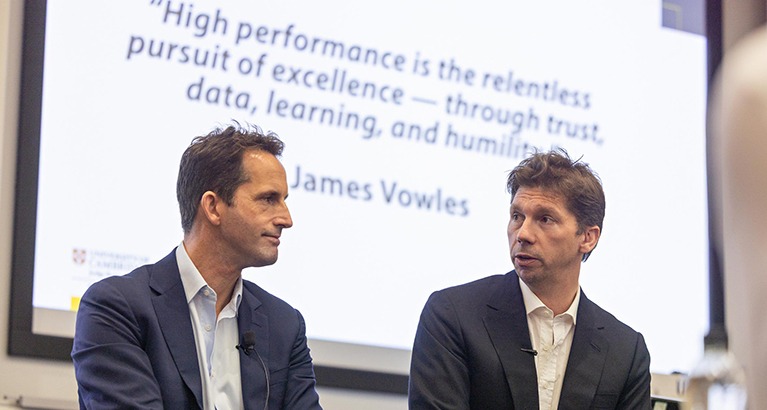Honorary Professor of International Management
Co-Director of the Cambridge Centre for Chinese Management
Fellow and Director of Studies in Management at Jesus College
BA (Macquarie University), MA (University of Cambridge), PhD (Harvard University)
My research interests include globalisation and its implications for corporate strategy, business ecosystems, merger and acquisition strategy, strategies for success in China and for a carbon-constrained world. I’ve served as a non-executive director and chairman of publicly listed companies and new ventures in industries ranging from whisky to sustainable energy.
I’m a member of the Strategy and International Business subject group at Cambridge Judge Business School, and along with my colleagues I actively contribute to both academic and business communities.

Professional experience
Professor Williamson has wide experience in research, consulting and executive education as well as serving as a non-executive. He has worked in Australia, France, Hong Kong, Singapore, Switzerland, and the United States, before returning to Britain to join Cambridge Judge Business School, where he founded the Advanced Leadership Programme, and at Jesus College, where he is Fellow and Director of Studies in Management. He is currently Chairman of the digital process automation company Bizagi, and has served as a non-executive director of both listed and private companies across a wide variety of industries, including textiles, whisky, green energy, hedge funds, software and sales training.
Professor Williamson was formerly with the Boston Consulting Group in London, and Merrill Lynch. He serves on the editorial boards of European Management Journal, and Academy of Management Learning and Education. Peter has acted as consultant on business strategy, mergers and acquisitions, and international expansion to numerous companies as well as to governments and international organisations throughout the Asia-Pacific region as well as in Europe and North America. He has experience in China since 1983, assisting numerous multinationals, and more recently, Chinese companies venturing abroad.
Previous appointments
Prior to joining Cambridge Judge Business School, Professor Williamson was ten years with the Asian Business and International Management faculty at INSEAD (1997-2007). Between 2003 and 2007 he was also Visiting Professor in Strategy at the Cheung Kong Business School in Beijing. He was Visiting Professor of Global Strategy at Harvard Business School (1993-1996) and Dean of MBA Programmes and Professor of Strategic and International Management at London Business School (1987-1992).
Publications
- Selected publications
- Journal articles
- Books, monographs, reports and case studies
- Book chapters
- Working papers
Selected publications
- De Meyer, A. and Williamson, P.J. (2020) Ecosystem edge: sustaining competitiveness in the face of disruption. Stanford, CA: Stanford University Press.
- Symeou, P.C., Zyglidopoulos, S. and Williamson, P. (2018) “Internationalization as a driver of the corporate social performance of extractive industry firms.” Journal of World Business, 53(1): 27-38 (DOI: 10.1016/j.jwb.2017.07.004)
- Williamson, P.J. and Raman, A.P. (2011) “How China reset its global acquisition agenda.” Harvard Business Review, 89(4): 109-114
- Zeng, M. and Williamson P.J. (2007) Dragons at your door: how Chinese cost innovation is disrupting the rules of global competition. Boston, MA: Harvard Business School Press. (Also translated into Arabic, Chinese, Indonesian and Russian)
- Doz, Y., Santos, J. and Williamson, P. (2001) From global to metanational: how companies win in the knowledge economy. Boston, MA: Harvard Business School Press. (Also translated into Korean, Italian, and Portuguese)
- Markides, C.C. and Williamson, P.J. (1994) “Related diversification, core competences and corporate performance.” Strategic Management Journal, 15(Special Issue, Summer): 149-165
Journal articles
- Logue, D., Williamson, P., Roberts, A., Luo, Y. and Barrett, M. (2025) “Digital innovation, platforms, and global strategy.” Information and Organization, 35(1): 100562 (DOI: 10.1016/j.infoandorg.2025.100562)
- Wan, F., Pandit, N.R. and Williamson, P.J. (2024) “Developing non-traditional firm-specific advantages in domestic strategic factor markets: evidence from China.” Multinational Business Review, 32(3): 367-385 (DOI: 10.1108/MBR-06-2023-0107)
- Alvi, F.H. and Williamson, P.J. (2023) “Responses to global financial standards in emerging markets: regulatory neoliberalism and the Basel II Capital Accord.” International Journal of Finance and Economics, 28(3): 2635-2650 (DOI: 10.1002/ijfe.2554)
- De Meyer, A. and Williamson, P.J. (2023) “Kick-starting an innovation ecosystem.” Management and Business Review, 3(3): 24-34 (DOI: 10.1177/2694105820230303006)
- De Meyer, A. and Williamson, P.J. (2022) “Thriving as an ecosystem partner.” European Business Review, 26 September 2022
- Liu, W., Beltagui, A., Ye, S. and Williamson, P. (2022) “Harnessing exaptation and ecosystem strategy for accelerated innovation: lessons from the VentilatorChallengeUK.” California Management Review, 64(3): 78-98 (DOI: 10.1177/00081256211056651)
- Rong, K., Kang, Z. and Williamson, P.J. (2022) “Liability of ecosystem integration and internationalisation of digital firms.” Journal of International Management, 28(4): 100939 (DOI: 10.1016/j.intman.2022.100939)
- Williamson, P.J., Symeou, P.C. and Zyglidopoulos, S. (2022) “International diversification, legitimacy, and corporate social performance of extractive industry multinationals.” Global Strategy Journal, 12(2): 359-393 (DOI: 10.1002/gsj.1405)
- Williamson, P. (2021) “De-globalisation and decoupling: post-COVID-19 myths versus realities.” Management and Organization Review, 17(1): 29-34 (DOI: 10.1017/mor.2020.80)
- Williamson, P., Guo, B. and Yin, E. (2021) “When can Chinese competitors catch up? Market and capability ladders and their implications for multinationals.” Business Horizons, 64(2): 223-237 (DOI: 10.1016/j.bushor.2020.11.007)
- Zhang, M.Y. and Williamson, P. (2021) “The emergence of multiplatform ecosystems: insights from China’s mobile payments system in overcoming bottlenecks to reach the mass market.” Technological Forecasting and Social Change, 173: 21128 (DOI: 10.1016/j.techfore.2021.121128)
- Zhou, A.J., Williamson, P.J. and Tung, R.L. (2021) “Editorial.” Cross Cultural and Strategic Management, 28(2): 229-234 (DOI: 10.1108/CCSM-05-2021-237)
- Wan, F., Williamson, P. and Pandit, N.R. (2020) “MNE liability of foreignness versus local firm-specific advantages: the case of the Chinese management software industry.”International Business Review, 29(1): 101623 (DOI: 10.1016/j.ibusrev.2019.101623)
- Wan, F., Williamson, P., Yin, E. and Lei, L. (2020) “Is disruptive innovation in emerging economies different? Evidence from China.”Journal of Engineering and Technology Management, 57: 101590 (DOI: 10.1016/j.jengtecman.2020.101590)
- Wan, F., Williamson, P. and Yin, E. (2019) “Enabling cost innovation by non-traditional organizational processes: the case of Chinese firms.”Technological Forecasting and Social Change, 139: 352-361 (10.1016/j.techfore.2018.12.003)
- Ramamurti, R. and Williamson, P.J. (2019) “Rivalry between emerging-market MNEs and developed-country MNEs: capability holes and the race to the future.”Business Horizons, 62(2): 157-169 (DOI: 10.1016/j.bushor.2018.11.001)
- Trevor, J. and Williamson, P. (2019) “How to design an ambidextrous organisation.”The European Business Review, 24 April 2019
- Williamson, P.J., Wu, X. and Yin, E. (2019) “Learning from Huawei’s superfluidity.”Ivey Business Journal, May/Jun
- Williamson, P. and De Meyer, A. (2019) “How to monetize a business ecosystem.”Harvard Business Review, 30 September 2019
- Hertenstein, P. and Williamson, P.J. (2018) “The role of suppliers in enabling differing innovation strategies of competing multinationals from emerging and advanced economies: German and Chinese automotive firms compared.”Technovation, 70–71: 46-58 (DOI: 10.1016/j.technovation.2018.02.008)
- Symeou, P.C., Zyglidopoulos, S. and Williamson, P. (2018) “Internationalization as a driver of the corporate social performance of extractive industry firms.”Journal of World Business, 53(1): 27-38 (DOI: 10.1016/j.jwb.2017.07.004)
- Williamson, P.J., Hoenderop, S. and Hoenderop, J. (2018) “An alternative benchmark for the validity of China’s GDP growth statistics.”Journal of Chinese Economic and Business Studies, 16(2): 171-191 (DOI: 10.1080/14765284.2018.1438867)
- Williamson, P. and Wan, F. (2018) “Emerging market multinationals and the concept of ownership advantages.”International Journal of Emerging Markets, 13(3): 557-567 (DOI: 10.1108/IJoEM-08-2017-0319)
- Williamson, P.J., Wu, X. and Yin, E. (2018) “Super-fluidity: creating an organization that flexes with the market [in Chinese].”Harvard Business Review China, May: 121-127
- Rezk, R., Singh Srai, J. and Williamson, P.J. (2016) “The impact of product attributes and emerging technologies on firms’ international configuration.”Journal of International Business Studies, 47(5): 610–618 (DOI: 10.1057/jibs.2016.9)
- Williamson, P.J. (2016) “Building and leveraging dynamic capabilities: insights from accelerated innovation in China.”Global Strategy Journal, 6(3): 197-210 (DOI: 10.1002/gsj.1124)
- Williamson, P.J. (2016) “Chinese acquisitions in Europe: absorptive capacity and impacts on competitive advantage.” Uluslararasi Iliskiler (International Relations), 13(49): 61-83
- Zyglidopoulos, S., Williamson, P. and Symeou, P.C. (2016) “The corporate social performance of developing country multinationals.”Business Ethics Quarterly, 26(3): 379-406 (DOI: 10.1017/beq.2016.41)
- Santos, J.F.P. and Williamson, P.J. (2015) “The new mission for multinationals.” MIT Sloan Management Review, 56(4): 45-54
- Wan, F., Williamson, P.J. and Yin, E. (2015) “Antecedents and implications of disruptive innovation: evidence from China.”Technovation, 39-40: 94-104 (DOI: 10.1016/j.technovation.2014.05.012)
- Williamson, P.J. (2015) “The competitive advantages of emerging market multinationals: a re-assessment.”Critical Perspectives on International Business, 11(3/4): 216-235 (DOI: 10.1108/cpoib-02-2014-0008)
- Williamson, P.J. and Yin, E. (2014) “Accelerated innovation: the new challenge from China.” MIT Sloan Management Review, 55(4): 1-8
- Williamson, P.J. and De Meyer, A. (2012) “Ecosystem advantage: how to successfully harness the power of partners.” California Management Review, 55(1): 24-46
- Williamson, P.J. and Raman, A.P. (2011) “How China reset its global acquisition agenda.” Harvard Business Review, 89(4): 109-114
- Yin, E. and Williamson, P.J. (2011) “Rethinking innovation for a recovery.”Ivey Business Journal (Online Edition), May/Jun
- Williamson, P.J. (2010) “Cost innovation: preparing for a ‘value-for-money’ revolution.” Long Range Planning, 43(2-3): 343-353
- Williamson, P. and Zeng, M. (2009) “Value-for-money strategies for recessionary times.” Harvard Business Review, 87(3): 66-74
- Williamson, P. and Zeng, M. (2008) “How to meet China’s cost innovation challenge.” Ivey Business Journal (Online Edition), 72(3): article 761
- Santos, J., Doz, Y. and Williamson, P. (2004) “Is your innovation process global?” MIT Sloan Management Review, 45(4): 31-37
- Williamson, P.J. and Zeng, M. (2004) “Strategies for competing in a changed China.” MIT Sloan Management Review, 45(4): 85-91
- Markides, C.C. and Williamson, P.J. (1994) “Related diversification, core competences and corporate performance.” Strategic Management Journal, 15(Special Issue, Summer): 149-165
Books, monographs, reports and case studies
- De Meyer, A. and Williamson, P.J. (2020) Ecosystem edge: sustaining competitiveness in the face of disruption. Stanford, CA: Stanford University Press.
- Williamson, P. and Wang, M.J. (2015) “Alibaba Group’s Taobao: from intermediary to ecosystem enabler.” The Case Centre: 314-139-1.
- Williamson, P.J., Ramamurti, R., Fleury, A. and Fleury, M.T. (eds.) (2013) The competitive advantage of emerging country multinationals. Cambridge: Cambridge University Press.
- Williamson, P. and De Meyer, A. (2010) “ARM Holdings Plc: ecosystem advantage.” European Case Clearing House (ECCH).
- Zeng, M. and Williamson P.J. (2007) Dragons at your door: how Chinese cost innovation is disrupting the rules of global competition. Boston, MA: Harvard Business School Press.
- Williamson, P.J. (2004) Winning in Asia: strategies for the new millennium. Boston, MA: Harvard Business School Press. (Also translated into Korean and Italian)
- Doz, Y., Santos, J. and Williamson, P. (2001) From global to metanational: how companies win in the knowledge economy. Boston, MA: Harvard Business School Press. (Also translated into Korean, Italian, and Portuguese)
Book chapters
- Williamson, P.J. (2021) “Chinese cost innovation, the Shanzhai phenomenon, and accelerated innovation.” In: Fu, X., McKern, B. and Chen, J. (eds.) The Oxford handbook of China innovation. New York, NY: Oxford University Press, New York
- Williamson, P. (2020) “Realizing the potential of the Belt and Road Initiative: what role for M&A?” In: De Cremer, D., McKern, B. and McGuire, J. (eds.) The Belt and Road Initiative: opportunities and challenges of a Chinese economic ambition. London: Sage, pp.221-235
- Williamson, P.J. and Wan, F. (2019) “How real are the opportunities for multinationals in China?” In: Grosse, R. and Meyer, K.E. (eds.) The Oxford handbook of management in emerging markets. New York: Oxford University Press, pp.745-762
- Williamson, P.J. and Yin, E.Y. (2013) “The new wave of disruptive innovation from China: why and how global incumbents need to respond.” In: Ling, P.P. (ed.) Disruptive innovation in Chinese and Indian businesses: the strategic implication for local entrepreneurs and global incumbents. Abingdon, UK and New York, NY: Routledge, pp.179-198.
- Williamson, P.J. and Yin, E.Y. (2013) “Innovation by Chinese EMNEs.” In: Williamson, P, Ramamurti, R, Fleury, A. and Fleury, M. T. L. (eds.): The competitive advantage of emerging market multinationals. Cambridge: Cambridge University Press, pp.64-94
- Williamson, P.J. and Yin, E. (2009) “Racing with the Chinese dragons.” In Alon, I. et al. (eds.): China rules: globalization and political transformation. New York: Palgrave Macmillan, pp.69-100
Working papers
- Trevor, J. and Williamson, P. (2014) “A blueprint for the next generation organisation: reconciling agility, efficiency and purpose.” Cambridge Judge Business School Working Papers, No.01/2014. Cambridge: University of Cambridge.
Awards and honours
- Sloan-Pricewaterhouse Coopers Award honouring those articles that have contributed to the enhancement of management practice, 2005
- Lloyds Tercentenary Fellow, 2001
- Fulbright Scholar, 1980-1984
- Frank R. Knox Memorial Fellow, 1980-1984
News and insights
Leaders from across global business joined a special event at Cambridge Judge Business School – Unpacking High Performance: From the Racetrack to the Boardroom – in which the connection between high performance in sport and business was explored by guests including James Vowles, Team Principal of the Formula 1 Team Atlassian Williams Racing, and Sir Ben Ainslie, the world’s most successful Olympic sailor with 4 Gold and one Silver medal and winner of the America’s Cup in 2013.
AI and technology
AI is changing innovation – here’s how
Artificial Intelligence (AI) has evolved beyond being just a tool for efficiency. It’s now a game-changer in how businesses approach innovation.
Insight
Turning the tables
Western companies should now copy China for digital innovation, says a journal article co-authored by Professor Peter Williamson of Cambridge Judge Business School.
Media coverage
Kompas.com | 14 March 2023
Businesses in Indonesia are potential but strict, business actors need to set operational strategies appropriately
Peter Williamson, Honorary Professor of International Management at Cambridge Judge Business School, is mentioned in this article about Western companies operating in Asia.
The New York Times | 11 April 2022
Globalisation isn’t over. It’s changing.
Peter Williamson, Honorary Professor of International Management at Cambridge Judge Business School, is cited in an article in The New York Times that says the idea of “deglobalisation” may be fashionable but it is incorrect — as deglobalisation is merely changing.
Forbes | 21 December 2021
How ready are companies for the post-pandemic world?
An article looking at how organisations are getting ready for post-Covid world cites two papers co-authored at Cambridge Judge Business School.
A report launched by the World Economic Forum, co-authored by Cambridge Judge PhD student Ariel de Fauconberg, outlines how small- and medium-sized enterprises (SMEs) can best position themselves to be ‘future-ready. “Our global assessment showed no significant differences of future readiness of SMEs at the regional or the industry level,” the paper says.
And another study co-authored by Professor Peter Williamson “highlights the value of such collaborations in the context of the UK government’s VentilatorChallengeUK (VCUK) to try and ensure an adequate supply of ventilators to hospitals.”
Cambridge Independent, 10 June 2021
‘West can learn from Chinese digital successes’, say Cambridge authors
Business Weekly, 7 June 2021
Learn from China re profitable digital innovation
Bloomberg, 26 March 2021
Talk of de-globalisation is fashionable but wrong
Strategy & Business, 5 October 2020
Creating a powerful ecosystem to sustain competitiveness
China Daily, 28 September 2020
Shaping the future
China Daily, 24 September 2020
Country makes giant strides in innovation
Business Because, 18 September 2020
What does Huawei’s UK 5G ban mean for the Internet Of Things?
China Daily, 27 August 2020
Unified effort will be crucial to recovery
Shanghai Daily, 19 August 2020
Worrying signs of knee-jerk reaction to COVID-19
Sputnik News, 22 May 2020
Trump’s anti-China rhetoric is unproductive but might help him win 2020 race, analysts suggest
Government Computinge, 13 February 2020
Internet needs monitoring by WTO-type body, says new report
CCTV (English), 29 January 2020
UK gives Huawei green light to help build 5G network
Harvard Business Review, 30 September 2019
How to monetize a business ecosystem
Sputnik News, 29 August 2019
‘US creating alternative 5G network is a pipe-dream’
China Daily, 24 January 2019
Huawei should focus on key supporters
China Daily, 21 January 2019
Huawei faces up to protectionism
The Telegraph, 24 December 2018
As in the past, opening up is the key to China’s future
Market Screener, 10 October 2018
China Mobile: Dual drivers
The New York Times, 15 July 2018
China’s strong economic growth figures belie signs of weakness
China Daily, 3 March 2018
New era for R&D




